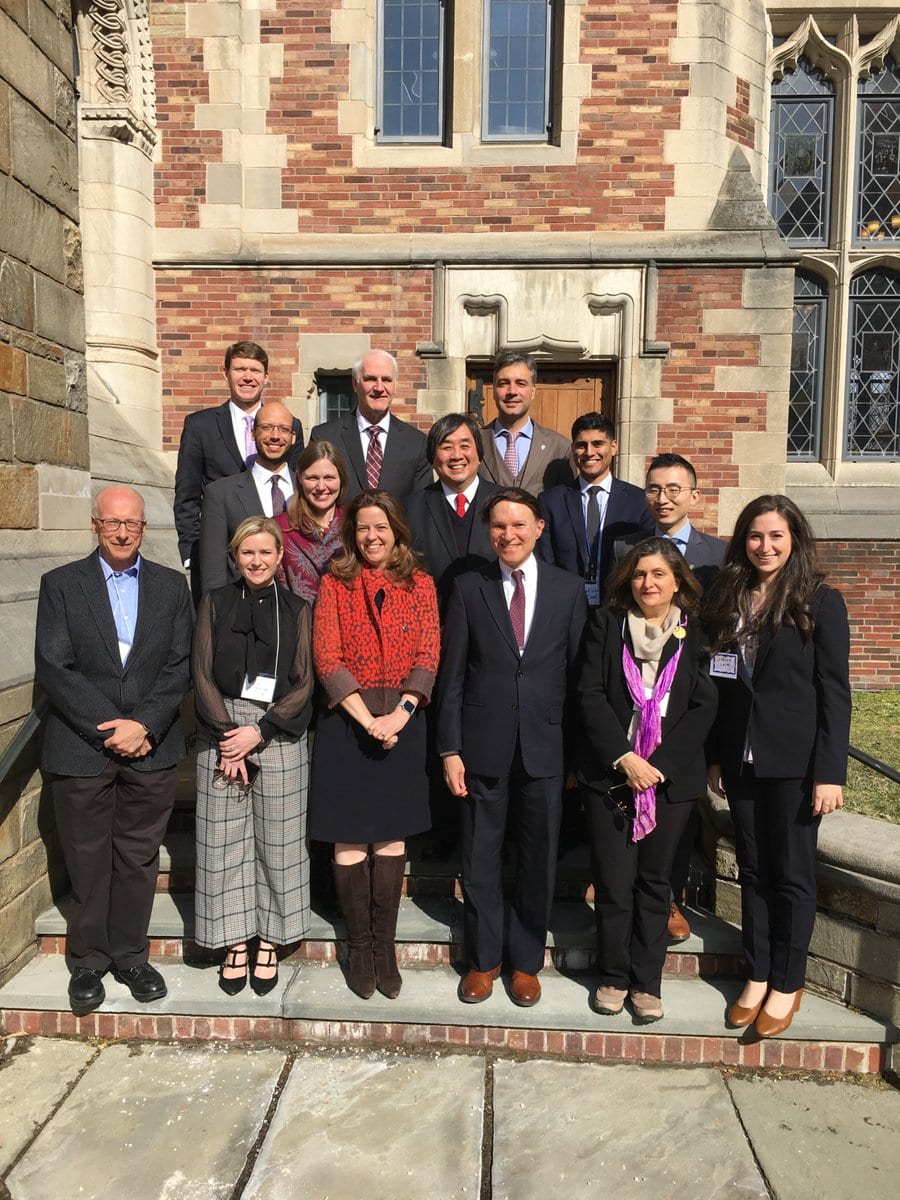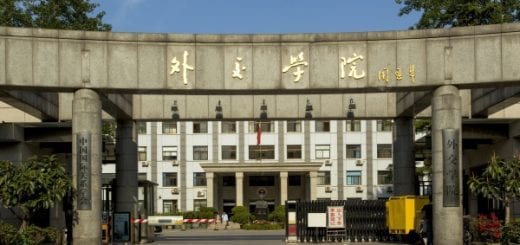Virtual Symposium: China and the International Legal Order
China and International Legal Order
Virtual Symposium
HILJ-YJIL-Oxford | October 15, 2020
To register, please click the link and provide your name, email address, affiliation, and job title (including student): https://harvard.zoom.us/webinar/register/WN_RCxnlKkiQMujwaF1UdyTPg.
As deglobalization deepens in centers of capitalism in the North and the COVID-19 pandemic exacerbates tensions between the U.S. and China, China continues to promote its version of economic globalization, particularly through emergent markets in much of the South. Chinese globalization consists of trade and global value chains, investment and development finance, and hard and soft infrastructure—including digital infrastructures—promoted by Chinese and multilateral development banks, SOEs and privately-owned companies, and internationalizing professional services like law firms. China is providing much-needed capital, health aid, and expertise to many regions of the world. At the same time, scholars suggest that “state capital,” which differs from private capital, catalyzes this form of globalization, meaning that outbound capital flows are aligned with the interests of the party-state. Along these lines, China is increasing active not only in existing multilateral legal organizations and financial institutions, such as the WTO, WHO, UN, ISO, but is also establishing its own parallel platforms including the Shanghai Cooperation Organization, Asian Infrastructure Investment Bank, eWTP, World Internet Conference, and the Belt and Road Initiative. Chinese development banks have, in recent years, provided more overseas lending than the World Bank and the IMF combined. China’s technology companies are the largest in the world and providing e-commerce and telecommunications facilities, including 5G, through the “Digital Silk Road.” These developments have significant consequences for global health governance, supply chains, labor and environmental rights, privacy, security, and freedom of speech. State response to the coronavirus pandemic has done little to create consensus around these issues and the interstate system appears to be shifting around two emergent spheres of influence—that of China and the U.S. It is at this current turning point that we convene this symposium to examine how a globalizing China is shaping or otherwise influencing the international legal order, one that has been allegedly designed by and for private capital from the global North, and conversely, how existing international legal institutions, Western states, and “Belt and Road” partner states are responding to an ascendant China.
This symposium, a unique collaboration between Harvard International Law Journal, Yale Journal of International Law, and the “China, Law and Development” project and the Commercial Law Centre, both at the University of Oxford, features scholars from not only the U.S. and China but also Hong Kong, Singapore, the U.K., and Brazil. The symposium highlights the scholarship of not just established scholars, but also junior scholars, and law students, as well, including one panel devoted to law students. The symposium is aimed at opening up intellectual exchange about China’s relationship to the changing international legal order, including, centrally, the U.S.-China relationship, and also additional states that have strong economic, legal, and security ties with China.
5:00 PM – 5:30 PM
Opening Remarks
Matthew S. Erie, Associate Professor of Modern Chinese Studies and Principal Investigator of the CLD Initiative, Oxford University
William P. Alford, Jerome A. and Joan L. Cohen Professor of Law, Director of East Asian Legal Studies Program, Harvard Law School
Wang Chenguang, Professor of Law and Former Dean, Tsinghua University Law School
Welcome from the Hosts
Roberta T. Mayerle and Steven Wang, Editors-in-Chief of the Harvard International Law Journal
Ann Manov and Omar Shehabi, Co-Editor-in-Chief and Executive Editor for Features of the Yale Journal of International Law
5:30 PM – 6:50 PM
Panel 1: China and the World
PRESENTERS
Tom Ginsburg, Leo Spitz Professor of International Law and Professor of Political Science, University of Chicago Law School
“The BRI, Non-interference, and Democracy”
Wang Guiguo, President of Zhejiang University Academy of International Strategy and Law, Zhejiang University Guanghua Law School
“The Belt and Road in the Changing International Legal Order”
Steven Wang, J.D. Candidate and Co-Editor-in-Chief of the Harvard International Law Journal, Harvard Law School
“Indigenous Constitutionalism and Global Legitimacy: Uncovering Roots of Constitutionalism in the Chinese Past”
DISCUSSANTS
Taisu Zhang, Professor of Law, Yale Law School
Kristin van Zwieten, Clifford Chance Associate Professor of Law and Finance, and Director of the Commercial Law Centre of Harris Manchester College, Oxford University
MODERATOR
Lara Markey, Features Editor, Yale Journal of International Law
Panel 2: Facilitators of China Law
PRESENTERS
Matthew S. Erie and Sida Liu, Associate Professor of Sociology and Law, University of Toronto
“The Architects of China’s International Legal Order”
Weixia Gu, Associate Professor of Law, University of Hong Kong
“China’s Law And Development: A Case Study Of The China International Commercial Court”
Ji Li, John & Marilyn Long Professor of US-China Business and Law, University of California, Irvine School of Law
“Meeting Law’s Demand Chinese Multinationals as Consumers of US Legal Services”
DISCUSSANTS
William P. Alford
Linda Mulcahy, Professor of Socio-Legal Studies and Director of the Centre for Socio-Legal Studies, Oxford University
MODERATOR
Eric Holmberg, Line Editor, Harvard International Law Journal
Panel 3: Trade and Investment
PRESENTERS
Henry Gao, Associate Professor of Law, Singapore Management University
“Across the Great Wall: E-Commerce Joint Statement Initiative Negotiation and China”
Fabio Costa Morosini, Associate Professor, Federal University of Rio Grande do Sul School of Law, and Michelle Ratton Sanchez Badin, Associate Professor, Law School of Getulio Vargas Foundation
“Constituting China’s International Legal Ordering: Ideas And Practices Around Chinese Investments In The Brazilian Energy Sector”
Gregory Shaffer, Chancellor’s Professor of Law and Director of Center on Globalization, Law, and Society, University of California, Irvine School of Law
“Governing the Interface of China-US Trade Relations”
Xia King, Assistant Professor, The University of Hong Kong, Department of Law
“Unpacking China, Inc. In Africa: State-market Relations In China’s Outward Investment”
DISCUSSANTS
Mark Wu, Harvard Law School, Henry L. Stimson Professor of Law, Vice Dean for the Graduate Program and International Legal Studies, Harvard Law School
Kathleen Clausen, Associate Professor of Law, University of Miami School of Law
MODERATOR
Prakhar Bhardwaj, Article Editor, Harvard Law School
6:50 PM – 7:20 PM
Young Scholars Workshop
7:20 PM – 7:35 PM
Closing Remarks
Mark Wu
Robert Williams, Executive Director of Paul Tsai China Center, Yale Law School
Matthew S. Erie



